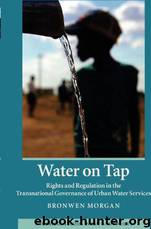Water on Tap: Rights and Regulation in the Transnational Governance of Urban Water Services (Cambridge Studies in Law and Society) Paperback by Bronwen Morgan

Author:Bronwen Morgan
Language: eng
Format: mobi
Tags: International business enterprises– Law and legislation, Privatization–Law and legislation, Right to water, Water utilities–Law and legislation
ISBN: 9781107411838
Publisher: Cambridge University Press
Published: 2012-12-12T18:30:00+00:00
Cambridge Books Online
http://ebooks.cambridge.org/
Water on Tap
Rights and Regulation in the Transnational Governance of Urban Water S
ervices
Bronwen Morgan
Book DOI: http://dx.doi.org/10.1017/CBO9780511974823
Online ISBN: 9780511974823
Hardback ISBN: 9781107008946
Paperback ISBN: 9781107411838
Chapter
5 - Moonlight plumbers in comparative perspective: electoral v. consti
tutional politics of access to water in South Africa and New Zealand p
p. 146-171
Chapter DOI: http://dx.doi.org/10.1017/CBO9780511974823.006
Cambridge University Press
5
Moonlight plumbers in comparative perspective:
electoral v. constitutional politics of access to water
in South Africa and New Zealand
5.1 Introduction
New Zealand and South Africa, may, at fi rst sight, appear an incongruous
pair of case studies for close juxtaposition. But they share a key feature
distinguishing them from the previous pair of case studies (Argentina
and Chile): neither country created an independent regulatory agency to
supervise access to water. Relatedly, both countries delegate the provision
of drinking water services to local municipalities. As we saw in Chapters
3 and 4 , the design and intended practice (though not always the oper-
ational reality) of independent regulatory agencies tended to refl ect the
infl uence of the managed liberalisation model. Th
ese two case studies,
then, both demonstrate an absence of centralised technocratic control
over the provision of access to water, and, as such, a public participatory
model of provision should have more space to develop.
Th
e chapter argues that a tempered public participatory model subsists
in both case studies, though not in any ‘pure’ form, at least partly because
both countries experienced pressures to adopt a managed liberalisation
model. South Africa has developed a well-known indigenous and pro-
gressive model of governance that is nonetheless constrained by other
contradictory aspects of the country’s broader political economy com-
mitments. Th
e South African model is also much more powerful on paper
in policy and legislation than at the operational level of implementation.
New Zealand has retained a model based on public provision, embedded
in small-scale local government, but some restructuring in Auckland has
nonetheless taken place along modifi ed managed liberalisation lines .
Put like this, these case studies may seem to resemble milder versions
of the outcome in Bolivia ( Chapter 3 ). But the absence of a centralised
regulatory agency, the related prominence of local government delivery,
and the relatively narrower scope of foreign private sector participation
distinguish them from Bolivia. At the heart of disputing in these two case
146
Downloaded from Cambridge Books Online by IP 14.139.43.12 on Tue Oct 09 09:02:28 BST 2012.
http://dx.doi.org/10.1017/CBO9780511974823.006
Cambridge Books Online © Cambridge University Press, 2012
. Introduction
147
studies was a tension between socio-economic rights on the one hand,
and contract and market rights on the other, a tension underpinning the
terms of exchange controlling access to water. Although this tension was
central to the Bolivian case, it plays out here in a very diff erent political
context: one of predominantly municipal governance and relatively less
transnational imposition of managed liberalisation. In Bolivia, the pri-
mary focus of the struggle was on property rights, articulated in mass
direct action inspired by a conception of ‘water as territory’. By contrast,
the main tensions in these two case studies were between diff erent aspects
of ‘water as service’ .
A focus on ‘water as service’ was also a shared facet of the struggles
chronicled in Chapter 4 , in Argentina and Chile. But whereas the two
Latin American cases focused on ‘regulator
Download
This site does not store any files on its server. We only index and link to content provided by other sites. Please contact the content providers to delete copyright contents if any and email us, we'll remove relevant links or contents immediately.
Day by Elie Wiesel(2781)
The Age of Genius by A. C. Grayling(2584)
Gideon's Spies: The Secret History of the Mossad by Gordon Thomas(2346)
The Gulag Archipelago (Vintage Classics) by Aleksandr Solzhenitsyn(2098)
FATWA: Hunted in America by Pamela Geller(2012)
Columbine by Dave Cullen(1863)
Men Explain Things to Me by Rebecca Solnit(1724)
The Rule of Law by Bingham Tom(1690)
Anatomy of Injustice by Raymond Bonner(1664)
Examples & Explanations: Administrative Law by William F. Funk & Richard H. Seamon(1642)
Three Cups of Tea by Greg Mortenson(1613)
The Source by James A. Michener(1605)
That Every Man Be Armed by Stephen P. Halbrook(1578)
ADHD on Trial by Michael Gordon(1574)
Future Design by Unknown(1570)
Gideon's Spies by Gordon Thomas(1504)
Palestinian Walks by Raja Shehadeh(1494)
Constitutional Theory by Carl Schmitt(1451)
Nothing to Envy by Barbara Demick(1445)
